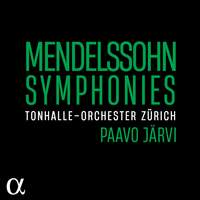Recording of the Week,
Paavo Järvi conducts Mendelssohn symphonies
Even when pianissimo Järvi propels the music onwards, whilst accents and sforzandos are scrupulously observed. This drive is on show in many other places also, whether it be the Scherzo of the Scottish Symphony, bursting with energy and dexterity, or the Italian Symphony with the radiant joie de vivre of the opening and impressive turns from the strings and flutes in their endlessly-swirling triplets during the final movement.
Another strength can be found in the slow movements, not least the rich, warm tone from the strings in the Adagio religioso section of the first part of Symphony No. 2, or the powerful intensity of the third movement of the Scottish. Järvi is never afraid to introduce rubato in order to sculpt a phrase and highlight an expressive moment. Sometimes this extends into alterations of the main tempo itself (such as a cheeky Più mosso at the end of the first movement of Symphony No. 1 to get us over the finishing line with added excitement). Even when Järvi’s fluidity of pulse is perhaps more extreme than the norm (for example, a passage about five minutes into the first movement of the Reformation Symphony, where he suddenly applies the brakes more than I was anticipating, before gradually returning to the principal tempo during the next minute or so), I completely understood why he was doing it, and it always felt entirely in service of the music.
Overall, I found the Reformation Symphony especially to be a most persuasive account of a work that I must admit I often have trouble making sense of - here the opening is solemn but not plodding, and Järvi’s aforementioned approach to tempo means that there is urgency when appropriate but also space to breathe as required. There’s certainly plenty of fire in the main Allegro section, with immaculately precise string playing in their frequent quaver runs.
As a bonus, the set includes a selection of incidental music from A Midsummer Night’s Dream. Like the symphonies, this is a spirited performance, with satisfyingly rustic bassoons for the entrance of the mechanicals at the start of Act Three, and a stylish account of the Nocturne. In the overture the brays of the donkey are very well done, and I was delighted that Järvi uses an ophicleide rather than the common substitution these days of a tuba - it makes a small but perceptible difference to the character of the music. There was one unexpected moment: having been accustomed to hearing Shakespeare’s text, it took me mildly by surprise when, in the soprano duet, the first words I heard were not “You spotted snakes with double tongue” but instead “Bunte Schlangen, zweigezüngt!” It makes sense, of course, as Mendelssohn wrote the music for an 1843 Potsdam production of the play in a German translation by August Wilhelm Schlegel, but it took me a few seconds to adjust!
When discussing why he wanted to record these symphonies, Järvi stated that he doesn’t think Mendelssohn gets the attention he deserves. With such committed playing as this, I for one am very grateful that he has directed his focus towards these pieces.
Tonhalle-Orchester Zürich, Paavo Järvi
Available Formats: 4 CDs, MP3, FLAC, Hi-Res FLAC




